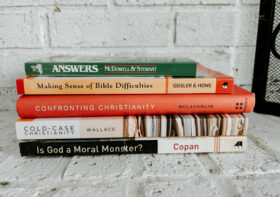My Favorite Bible Study Tools
Studying the Bible can be daunting. I’m writing this post today to share some tools that have really helped me study the Bible effectively. If you’re looking to enhance your study or even start studying for the first time, I hope that these tools will be as helpful to you as they are to me.
- A Highlighter Set
I have a very specific highlighting system that I have that I will outline in another post soon. Highlighter sets that include purple, green, yellow, orange, pink, and blue are at the top of my list for this reason. Highlighting helps you look at the bigger picture, as well as provides quick reference when you are looking through past study. My favorites are either the Midliner Pastel Set, or the Muted Pastel Set from the Daily Grace. - The Bible Handbook
I absolutely LOVE this guide, and I keep it next to my Bible at all times. It covers each book of the Bible while explaining the theme, key points, historical context, who wrote it, when it was written, why it was written, & an outline of the text for quick reference. I like to look it over before jumping into a new book so I can understand the context before reading. Reading the Bible in context is the most important thing you can do. - Bible Dictionary
I have a few of these, but the one that has been the most helpful is this Zondervan compact. It has definitions of people, places, objects, events, and concepts, maps & illustrations, summaries of books of the Bible, and archeological information. - Study Journal
I do not do my Bible study without using a study journal to organize my thoughts. I have probably tried every popular study journal at this point, but right now I really love the Abide Journal by The Daily Grace because it is more of an an all-in-one prayer and Bible study journal. It has tabs for Bible Study, Prayer, weekly gratitude and adoration, and a section that can be used for sermon notes, quotes, or anything else. If you’re looking for a journal that’s a little more challenging that you can use just for scripture, I’d recommend the In the Word Journal, which goes a little deeper. - A Good Commentary
Commentaries are probably my favorite things to use in Bible study! The commentary walks you through the text verse by verse, drawing out its main themes. It also comments on individual verses and deals with problems of interpretation. The aim is to get at the true meaning of the Bible and to make its message plain to readers today. You can’t go wrong with the Tyndale series, which is available for each book of the Bible in the Old or New Testament. One of my favorites is the Romans commentary. - A Bible You Will ACTUALLY Read
This one seems obvious, but it’s definitely true. A lot of people that I’ve talked to are carrying around old Bibles passed down from family, or maybe gifted to them, that are in random translations and may be confusing to read. I’d recommend the NIV or CSB translation for readability and closeness to the original text. It’s also at a 7th grade reading level, sans thee’s and thou’s. If you’re jumping into study for the first time, or maybe using an old Bible that you’re not quite understanding, it may be time to invest in something that you can actually read. I use this NIV note-taking Bible and it’s been my favorite so far (I may be a bit of a Bible hoarder).
In my opinion, these are the best Bible study tools to invest in. You could argue that you don’t really need “stuff” to study the Bible, but I do think assistance in proper interpretation is absolutely vital. A lot of the confusion with Christianity today is the lack of understanding of scripture. We are either taking scripture and twisting it to mean something it doesn’t, or not reading it in context and assuming it means something it doesn’t. Both are very harmful to ourselves and to others. I wrote a post here about reading the Bible incorrectly.
You definitely don’t have to get super academic every single time. Sometimes, I just like to sit in the backyard on a cooler day with some coffee, and just read. There’s definitely some balance that takes place. What really matters most is that you’re opening your Bible up as much as you can, because consistency is key. The beautiful thing is that we can ask the Holy Spirit for guidance and understanding each time we open, and if we do that, I believe that he will not let us walk away from it transformed.


